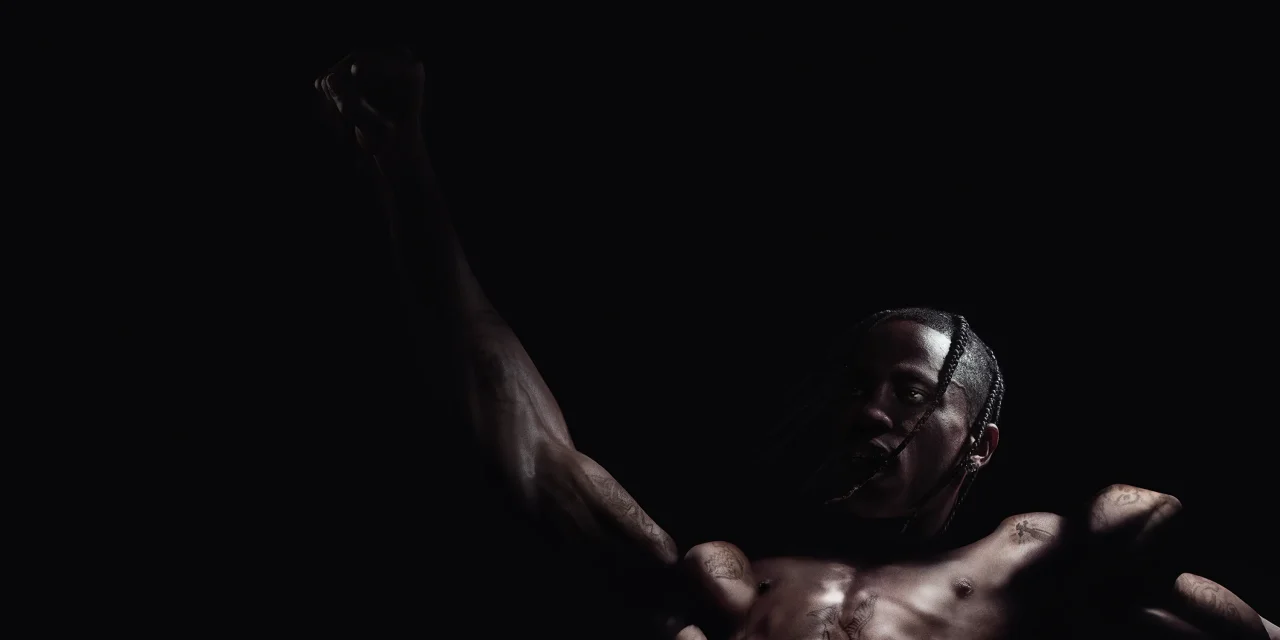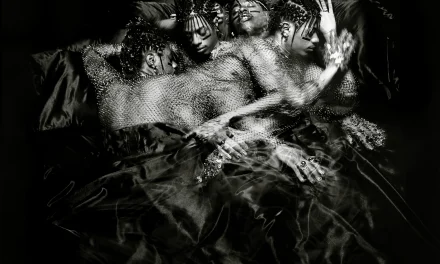The Houston native’s newest spectacle has captured the world’s attention – and failed to deliver any substance.
In one of rap’s worst commercial years since the turn of the century, it’s no wonder that hip-hop heads around the world have been anxiously awaiting the return of Travis Scott, a man who took the world by storm with his debut album Rodeo and never looked back. In 2020, on the 2-year anniversary of his third solo album, ASTROWORLD, Travis teased a new record in a thank-you to his fans that concluded with the words “see you in Utopia.” This lead many fans to believe Scott was gearing up for another release, but a year passed with no more news.
Then, in November of 2021, a crowd surge incident claimed the lives of 10 and injured hundreds at Scott’s 2021 Astroworld Festival in his hometown of Houston, Texas. Though nobody associated with the festival was indicted on criminal charges, a decision made by a Texas Grand Jury in June of this year, Scott and his team faced both civil liability and media backlash following the incident. Scott was accused of failing to address obvious unrest and dangerous situations within the crowd, instead continuing to perform and inadvertently promoting his fans’ behavior.
In the 2 years since, however, the public has begun to look more favorably upon the 32-year-old. It appears that all along, he was working on new music while he waited for the situation to die down. Now, free of criminal responsibility, Scott has launched himself back into the limelight with his newest record, UTOPIA.
The album’s opener, “HYANEA,” begins with haunting vocals performing an a cappella piece outlining the precariousness of Scott’s current “situation” – presumably a reference to the Astroworld Tragedy backlash. Though it may sound good, this intro doesn’t actually give the listener much content to grab on to before launching into a crunchy, upbeat track that sees Travis continue his long-standing tradition of creating unique sonic aesthetics and worlds on his albums. The track then finishes with an extended spoken-word sample from Funkadelic’s “Maggot Brain”, which ends up feeling terribly out of place.
The record rebounds well, however, with “THANK GOD,” a song that leans on its build-up and dynamics to create a cinematic experience and deliver some extremely fun moments. It’s on the following track, however, that the album really begins to take shape. “MODERN JAM” features alternative up-and-comer Teezo Touchdown, as well as heavy influence from Scott’s mentor Kanye West and long-time producer Mike Dean. The thumping electronic drums that power the track were originally intended for “I Am A God”, a 2013 cut from West’s album Yeezus that was written and produced by Dean. When the song underwent a sonic makeover, the drums were scrapped, only for Scott to resurrect them a decade later.
This sample gives the audience a clear insight into everything Travis is doing on UTOPIA, whether he realizes it or not. This album is a rehashing of Kanye West’s cultural takeover of the 2010s. Every aspect of UTOPIA’s album cycle mirrors this stage of West’s career: The desolate, crunchy soundscape? Yeezus did it first. The star-studded features list? Sounds a lot like The Life of Pablo. Even Scott’s 3-year hiatus sprinkled with controversy and throwaway singles mirrors West’s. UTOPIA is a summer blockbuster that we’ve seen before. That doesn’t mean we won’t buy a ticket, but it’s going to take a lot to win over the audience.
The blockbuster continues with “MY EYES,” the record’s fourth track, which opens with a slow, psychedelic section that features uncredited vocals from English singer-songwriter Sampha. The song soon escalates, however, introducing uptempo hi-hats atop ambient vocal and synth samples. When the thumping kick and snare come in, Travis matches their energy with an attempt at introspective bars in his signature high-energy, drowned-in-autotune style. The next four tracks embrace the change of direction that this beat switch provides, keeping the energy high and providing several highlights. “GOD’S COUNTRY” features a childish vocal sample that sounds like something out of a horror movie trailer, while “SIRENS” sees Travis again take a page out of the Kanye West production playbook with blown-out drums, chopped-up vocals, and soaring Mike Dean synths. The two tracks that follow, “MELTDOWN” and “FEIN,” are already proving to be two of the album’s biggest hits, featuring Drake and Playboi Carti respectively. It’s clear to see why these songs have been topping playlists since the album’s release; their menacing energy combines with flawless trap production to create some of the year’s best bangers.
No sooner has Playboi Carti departed the scene than Beyoncé enters on “DELRESTO (ECHOES)” and completely changes the sound of the album. Queen Bey lays her vocals over a beat that feels more like a dance record than a hip-hop one. In fact, the song mirrors the sound of Beyoncé’s recent album, RENAISSANCE, which drew heavy inspiration from disco and dance trends of the late 20th century. Travis returns to rapping on the next two tracks, “I KNOW” and “TOPIA TWINS.” This time around, instead of mimicking Kanye, he chooses to mimic Drake, first crooning toxic bars over a downtempo trap beat on “I KNOW” and then recruiting frequent Drake collaborator 21 Savage for “TOPIA TWINS” which, to its credit, is one of the most fun tracks on the album.
Next up is “CIRCUS MAXIMUS,” a track which harkens back to “MODERN JAM” with another sample from Kanye West’s Yeezus. This time, Travis pinches the drums from “Black Skinhead,” an aggressive and controversial track, and adds soaring vocals from Swae Lee and The Weeknd to create a cinematic moment that will surely provide for a rousing performance at Scott’s upcoming live shows. Again, we are reminded of West’s influence on this record: his fingerprints adorn the production, writing, flows, delivery, rollout, aesthetics, and so on. Evidently, in his absence from music due to his despicable anti-semitic statements and various other controversies, West has decided to live vicariously through his long-time protégé – and Travis seems perfectly content to let that happen.
But this isn’t even the record’s primary flaw. It’s biggest issue resurfaces on the following track, “PARASAIL,” when the album is again interrupted by more spoken-word poetry, this time from notable comedian Dave Chapelle. Chapelle attempts what can only be described as stoic ramblings in between laid-back performances from Scott and Swedish artist Yung Lean.
This track embodies lies one of UTOPIA’s main issues as a record. Throughout its 73-minute runtime, it continuously tries to fool the listener into thinking it is something it’s not: meaningful. Travis Scott, both the man and the brand, have seen a lot of turmoil in the past 2 years. A more poignant artist could have turned this series of events into a heartfelt and introspective work of art. Travis is not that poignant artist. If he could have accepted that, it would have been okay. Instead, Scott tries to get “deep” by bumbling his way through pseudo-intellectual slam poetry at seemingly random intervals throughout the album. By the end of the first track he is already so starved for ideas in this department that he turns to a decades-old recording that has little to do with the themes he’s trying to communicate to his audience, and midway through the album he leans on a middle-aged stand-up comedian to do his artistic heavy lifting. It’s sloppy to say the very least, and leaves a bad taste in the mouth of the listener. Travis Scott is good at making cinematic albums full of bangers. That’s what he does, and the world is perfectly content to let him do that and only that. After three years away from music, it seems he forgot he doesn’t need to get deep.
He does still remember how to make those bangers, however, as he proves on “SKITZO,” a track which features trap legend Young Thug and several beat switches. The track begins with an uptempo trap beat and finishes as a soulful boom-bap record that flows well into the next track, “LOST FOREVER” featuring Westside Gunn. One of the underground scene’s most exciting offerings, Gunn boasts a unique voice and flow that were once considered out of style. He is a callback to a past era, whereas Travis has always thrived on sounding futuristic and out-of-this-world. This contradiction between the two makes for a wonderful surprise when they display great chemistry over a haunting beat that features both production and a sample from singer-songwriter James Blake. Against all odds, Scott and Gunn combine for one of the album’s best tracks late in its runtime.
Next up is a pair of dance- and reggaeton-inspired tracks, namely “LOOOVE” and “K-POP,” which boast features from Kid Cudi, Bad Bunny, and The Weeknd between them. These tracks fit in nicely thanks to “DELRESTO,” which set the precedent for this sound on UTOPIA. They’re fine, but slightly disappointing – particularly “K-POP,” which was the album’s lead single and feels like it’s just there to collect Bad Bunny streams.
What follows is the album’s penultimate track and clearly one of its best. “TELEKINESIS” sees Travis and collaborator Future rapping about their ability to see the future and overcome their trauma through music. As the track builds, we get quality, expressive vocal performances from both Future and Trav before R&B star SZA comes in at the song’s emotional climax with one of the better performances of her career. Travis layers his vocals under SZA’s as trumpets sound in the background, and what follows is a beautiful final verse where SZA is allowed to air out her own dirty laundry and express her trauma as well. This song is one of few on the album that doesn’t feel like a Yeezus throwaway, a half-hearted dance tune, or RapCaviar fodder. It is something all its own, and finally provides the catharsis that Travis has been failing to provide for over an hour at this point.
Then Travis brings back 21 Savage and James Blake for the album’s final track, “TIL FURTHER NOTICE,” which features production from Metro Boomin. 21, who rarely delivers a bad feature, opens with a poorly written verse about a toxic relationship that pales in comparison to his previous appearance on the record. Travis also uses his verse to express the pain a past relationship has caused him, while Blake lends his haunting vocals to a hook that serves as the track’s only highlight. While the list of artists working on this track seemed promising, the song itself ends up feeling entirely out of place and fails to wrap up the album in the way that an outro should. With “TELEKINESIS” sitting right there, it’s a complete mystery as to why this song was chosen as UTOPIA’s final track.
Ultimately, UTOPIA should be remembered as a cautionary tale: an album full of hits that is insistent on killing its own momentum by trying to be thought-provoking without success. It had other missteps as well – Travis wore his influences on his sleeve to a detrimental degree and perhaps the tracklist could have been organized a little better – but the constant attempts at introspection are what really hold this record back. Of course it’s important to try and evolve throughout one’s career, but after this record, someone needs to step in and tell Travis he should stick to making hits. He’s really good at it.
Photo Credits: The Fader






